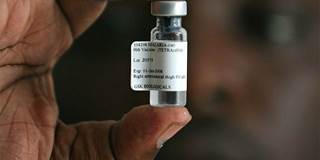In July, the EU approved RTS, S – a malaria vaccine also known by its trade name, Mosquirix – for use in children from six to 17 months old. While this is exciting news for everyone on the front line of the fight against the disease, many questions about the vaccine's deployment remain to be answered.
WASHINGTON, DC – For those on the frontline of the battle against malaria, news of the development of a vaccine against the parasite is an exciting development. In 2013, the disease was responsible for 584,000 deaths, nearly 90% of them in Sub-Saharan Africa; some 78% of its victims are children under the age of five. In the 97 countries in which malaria is endemic, it ravages the economic productivity of those who can least afford it: poor people with limited access to treatment and care.

WASHINGTON, DC – For those on the frontline of the battle against malaria, news of the development of a vaccine against the parasite is an exciting development. In 2013, the disease was responsible for 584,000 deaths, nearly 90% of them in Sub-Saharan Africa; some 78% of its victims are children under the age of five. In the 97 countries in which malaria is endemic, it ravages the economic productivity of those who can least afford it: poor people with limited access to treatment and care.